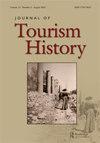沿着Bilād Al-S - hām和伊斯坦布尔之间的道路追踪奥斯曼商队
IF 0.9
Q4 HOSPITALITY, LEISURE, SPORT & TOURISM
引用次数: 1
摘要
本研究追溯了奥斯曼帝国时期在Bilād Al-S - hām(黎凡特)和伊斯坦布尔之间作为慈善捐赠而建造的奥斯曼商队旅馆(宾馆)。该研究借鉴了16世纪及之后的阿拉伯旅行,包括印刷的和非印刷的,以了解旅行的经历、印象和对这些商队的看法。研究表明,位于Bilād Al-S - hām和伊斯坦布尔之间路线上的城镇和村庄有几家商队旅馆。这些商队旅馆似乎也促进了住宅社区的出现,随着时间的推移,这些社区发展成为大城市。也有证据表明,奥斯曼商队被视为当地居民的经济机会,他们过去向旅行者和朝圣者出售食物和其他当地产品。该研究还利用旅行记录来确定逗留时间,并对这些旅社的住宿体验进行总体描述。这项研究对奥斯曼帝国的旅行和住宿设施的历史做出了重要贡献。本文章由计算机程序翻译,如有差异,请以英文原文为准。
Tracing the Ottoman caravansaries along the road between Bilād Al-S̲hām and Istanbul
ABSTRACT This study traces the Ottoman caravansaries (guesthouses) which were built as charitable endowments between Bilād Al-S̲hām (the Levant) and Istanbul during the Ottoman Empire. The study draws on Arabic travels, both printed and non-printed, from the sixteenth century and afterward, to understand travels’ experiences, impressions, and perceptions of these caravansaries. The study shows that towns and villages located on the route between Bilād Al-S̲hām and Istanbul were home to several caravansaries. It also appears that these caravansaries contributed to the emergence of residential communities which, over time, developed and turned into large cities. There is also evidence that Ottoman caravansaries were viewed as an economic opportunity for local inhabitants who used to sell food and other local products to travels and pilgrims. The study also draws on travels’ accounts to determine the length of stay and construct a general portrait of how the stay experience in these caravansaries were perceived. The study makes an important contribution to the history of travel and lodging facilities in the Ottoman Empire.
求助全文
通过发布文献求助,成功后即可免费获取论文全文。
去求助
来源期刊

Journal of Tourism History
HOSPITALITY, LEISURE, SPORT & TOURISM-
CiteScore
0.60
自引率
0.00%
发文量
16
期刊介绍:
The Journal of Tourism History is the primary venue for peer-reviewed scholarship covering all aspects of the evolution of tourism from earliest times to the postwar world. Articles address all regions of the globe and often adopt interdisciplinary approaches for exploring the past. The Journal of Tourism History is particularly (though not exclusively) interested in promoting the study of areas and subjects underrepresented in current scholarship, work for example examining the history of tourism in Asia and Africa, as well as developments that took place before the nineteenth century. In addition to peer-reviewed articles, Journal of Tourism History also features short articles about particularly useful archival collections, book reviews, review essays, and round table discussions that explore developing areas of tourism scholarship. The Editorial Board hopes that these additions will prompt further exploration of issues such as the vectors along which tourism spread, the evolution of specific types of ‘niche’ tourism, and the intersections of tourism history with the environment, medicine, politics, and more.
 求助内容:
求助内容: 应助结果提醒方式:
应助结果提醒方式:


